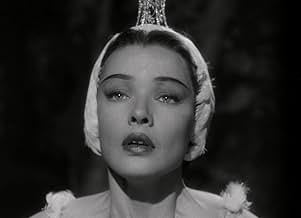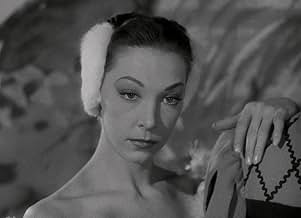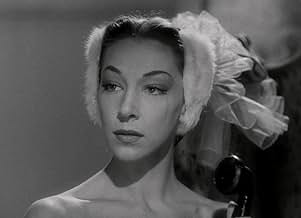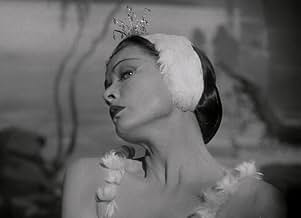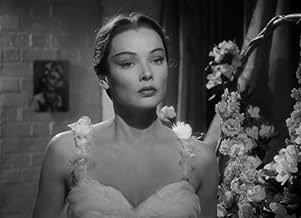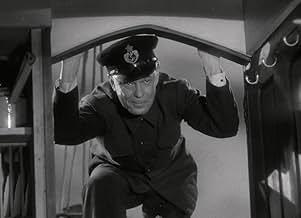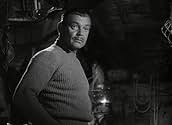VALUTAZIONE IMDb
6,2/10
956
LA TUA VALUTAZIONE
Aggiungi una trama nella tua linguaAn American reporter stationed in post-war Moscow marries a ballet dancer, but their relationship is threatened by the country's political volatility.An American reporter stationed in post-war Moscow marries a ballet dancer, but their relationship is threatened by the country's political volatility.An American reporter stationed in post-war Moscow marries a ballet dancer, but their relationship is threatened by the country's political volatility.
- Regia
- Sceneggiatura
- Star
Joseph Stalin
- Self
- (filmato d'archivio)
- (as Iosif Stalin)
Martin Benson
- Toasting Russian Officer
- (non citato nei titoli originali)
Jim Brady
- Guard at Bolshoi Theatre
- (non citato nei titoli originali)
Recensioni in evidenza
An odd film but one that is surprisingly watchable and provides an interesting insight into the early stages of the Cold War. The film conveys the menace of the era and the grim, cold and hate filled place that the Soviet Union always was. Indeed from what we now know, one may even regard the film as being soft on the Communists, as the two Russian women in the film who take western husbands would quite likely have been taken off to labour camps (and 90% likely to have been killed therefore) by Stalin's secret police rather than just denied the chance to leave the country.
Some of the acting leaves a little to be desired and Clark Gable particularly seems like he is being forced into a part and a budget that was several sizes too small for him, but nevertheless a worthy and reasonably intelligent effort.
The Anglo-American angle in the film is one I always enjoy, it is always good to see the Brits and the Americans getting together!
Some of the acting leaves a little to be desired and Clark Gable particularly seems like he is being forced into a part and a budget that was several sizes too small for him, but nevertheless a worthy and reasonably intelligent effort.
The Anglo-American angle in the film is one I always enjoy, it is always good to see the Brits and the Americans getting together!
HUAC schmaltz with an embarrassingly bad performance from Ms. Tierney whose Russian accent is one step above (or below) Boris and Natasha.
For Never Let Me Go Clark Gable has dusted off his American correspondent role from Comrade X. In that very funny comedy, Gable was playing an American newspaperman covering the Soviet Union before World War II. He's back at his correspondent's desk in this film. However here he's deadly in earnest as a man driven by love to get his Russian bride out of the police state.
Sadly the film was dated from its release with the prominent use of newsreel footage involving Joseph Stalin. The film was released on May 1, 1953 and Stalin had died in March of 1953. The state was the same, but the personalized red bogeyman that Stalin had become was no longer there. I'm sure that must have lessened the impact for those who saw Never Let Me Go in the theater.
During the war Gable meets ballerina Gene Tierney and in the spirit of the wartime alliance they fall in love and get married. But when the shooting war against Hitler stops and the Cold War starts, no one tells them NYET concerning romance. The increasingly cynical tone of Gable's stories make him an undesirable in the Soviet Union, he gets deported and Tierney is left behind. The Soviets don't recognize marriage and romance with the enemy.
Clark's not going to take that lying down. With Richard Haydn, another man who married a Russian girl left behind, they hire Bernard Miles who has a seaworthy craft and plan a rescue. It's quite a plan and a last minute hitch should have told any sensible person to try another day. Of course that's not what happens, but it does render the last minute rescue somewhat silly.
Tierney and Gable make a sincere of pair of romantic lovers. Even without the personalization of Stalin, the film is an accurate reflection of the times. Russians are a mighty suspicious lot of people, before, during, and after the Soviet Union. Kenneth More has a very nice role as a television broadcaster presumably for the BBC who helps the leads with some coded messages in his broadcasts.
Gable was getting a bit old for these kind of romantic daring do roles by 1953 though. It's not one of the top films of his career or in that last decade of that fabled Gable career.
Sadly the film was dated from its release with the prominent use of newsreel footage involving Joseph Stalin. The film was released on May 1, 1953 and Stalin had died in March of 1953. The state was the same, but the personalized red bogeyman that Stalin had become was no longer there. I'm sure that must have lessened the impact for those who saw Never Let Me Go in the theater.
During the war Gable meets ballerina Gene Tierney and in the spirit of the wartime alliance they fall in love and get married. But when the shooting war against Hitler stops and the Cold War starts, no one tells them NYET concerning romance. The increasingly cynical tone of Gable's stories make him an undesirable in the Soviet Union, he gets deported and Tierney is left behind. The Soviets don't recognize marriage and romance with the enemy.
Clark's not going to take that lying down. With Richard Haydn, another man who married a Russian girl left behind, they hire Bernard Miles who has a seaworthy craft and plan a rescue. It's quite a plan and a last minute hitch should have told any sensible person to try another day. Of course that's not what happens, but it does render the last minute rescue somewhat silly.
Tierney and Gable make a sincere of pair of romantic lovers. Even without the personalization of Stalin, the film is an accurate reflection of the times. Russians are a mighty suspicious lot of people, before, during, and after the Soviet Union. Kenneth More has a very nice role as a television broadcaster presumably for the BBC who helps the leads with some coded messages in his broadcasts.
Gable was getting a bit old for these kind of romantic daring do roles by 1953 though. It's not one of the top films of his career or in that last decade of that fabled Gable career.
"Never Let Me Go" is truly Clark Gable's last romantic movie. It shows the hardships on how an American reporter and a Russian ballerina must endure in order to marry and leave Russia. The movie shows how the Russian government interferred with the romance. In real life, Russia would hve done worst things to stop the romance, but this is a Hollywood romantic movie in the 1950's.
Clark Gable and the beautiful Gene Tierney make a beautiful couple and you route for them to escape and live happily ever after. This is a great movie to see on a rainy day or any day. It is on video.
Clark Gable and the beautiful Gene Tierney make a beautiful couple and you route for them to escape and live happily ever after. This is a great movie to see on a rainy day or any day. It is on video.
Clark Gable and Gene Tierney are teamed in "Never Let Me Go," a 1953 film. An American news writer, Philip Sutherland, (Gable) falls in love with a beautiful ballerina Marya, (Tierney), but she isn't allowed to leave Russia with him, despite being given an exit visa. A desperate Gable devises a plan to smuggle her out. British star Kenneth More plays a friend, Steve, who helps him, and Richard Haydn and Belita play another couple in similar circumstances.
Gable went through a tough time post-war - he returned from the service a widower, in the shadow of Rhett Butler, and well into his forties, older than many of the leading men who had gone into the service. Men his age had stayed home. Also, MGM hadn't been sitting around waiting - they had new stars. His immediate films post-war aren't memorable.
"Never Let Me Go" is a good romance, however, and a good watch. Gene Tierney is beautiful, if not very Russian, and Gable is earnest and sympathetic as a tough guy who will do anything to reunite with his wife. Thanks to some good acting, one feels invested in these characters.
You have to give it to Gable - his first credited film was in 1931, and when his last film, The Misfits, was released in 1961, he was still a huge star. Despite some so-so movies, he never lost his appeal. "Never Let Me Go" is better than a lot of films MGM gave him during this period.
Gable went through a tough time post-war - he returned from the service a widower, in the shadow of Rhett Butler, and well into his forties, older than many of the leading men who had gone into the service. Men his age had stayed home. Also, MGM hadn't been sitting around waiting - they had new stars. His immediate films post-war aren't memorable.
"Never Let Me Go" is a good romance, however, and a good watch. Gene Tierney is beautiful, if not very Russian, and Gable is earnest and sympathetic as a tough guy who will do anything to reunite with his wife. Thanks to some good acting, one feels invested in these characters.
You have to give it to Gable - his first credited film was in 1931, and when his last film, The Misfits, was released in 1961, he was still a huge star. Despite some so-so movies, he never lost his appeal. "Never Let Me Go" is better than a lot of films MGM gave him during this period.
Lo sapevi?
- QuizIn order to prepare for her role as a ballerina, Gene Tierney endured six weeks of grueling ballet lessons - two hours a day - under the tutelage of Anton Dolin. In long shots, she was doubled by Russian ballerina Nathalie Krassovska.
- BlooperThe city presented as Tallinn has a completely different geography than the real Tallinn; the area around the town is flat land.
- Citazioni
Philip Sutherland: The only way to figure the Russians is to put 2 and 2 together, make 9, add 7, divide by 4... and give up.
- ConnessioniReferenced in Hollywood Mouth (2008)
I più visti
Accedi per valutare e creare un elenco di titoli salvati per ottenere consigli personalizzati
- How long is Never Let Me Go?Powered by Alexa
Dettagli
Botteghino
- Budget
- 1.500.000 USD (previsto)
- Tempo di esecuzione1 ora 34 minuti
- Colore
- Proporzioni
- 1.37 : 1
Contribuisci a questa pagina
Suggerisci una modifica o aggiungi i contenuti mancanti

Divario superiore
By what name was Arrivò l'alba (1953) officially released in India in English?
Rispondi
